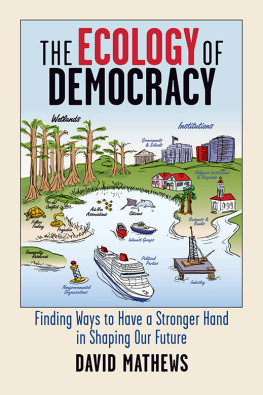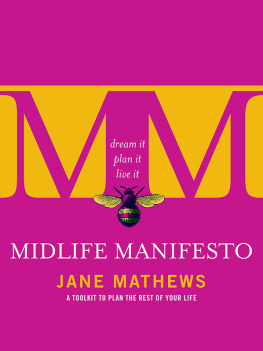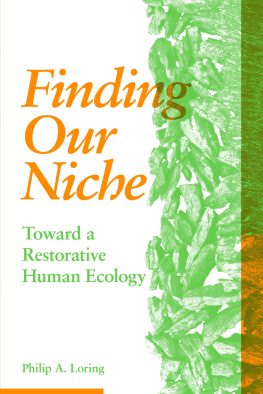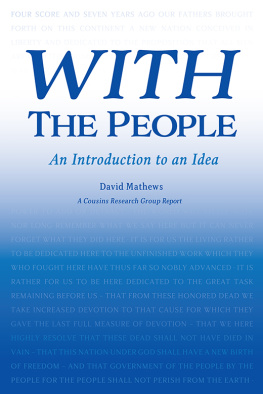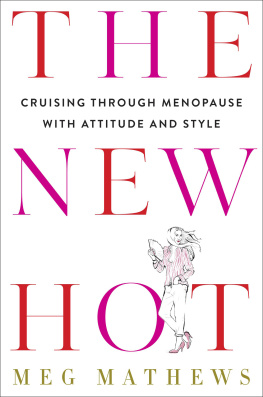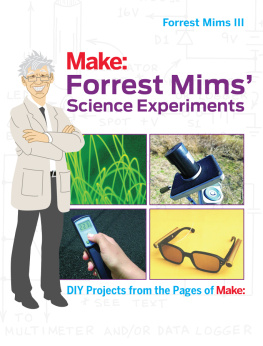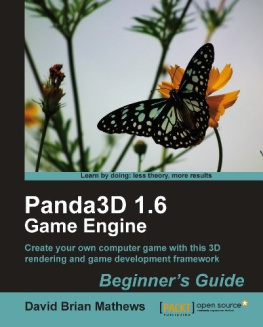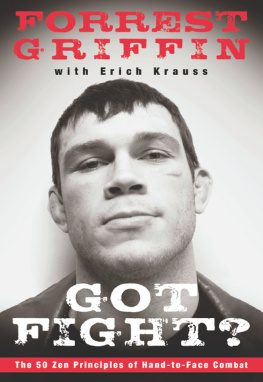The Ecology of Democracy: Finding Ways to Have a Stronger Hand in Shaping Our Future is published by the Kettering Foundation Press. The interpretations and conclusions contained in the book represent the views of the author. They do not necessarily reflect the views of the Charles F. Kettering Foundation, its directors, or its officers.
2014 David Mathews
ALL RIGHTS RESERVED
For information about permission to reproduce selections from this book, write to:
Permissions
Kettering Foundation Press
200 Commons Road
Dayton, Ohio 45459
This book is printed on acid-free paper.
First edition, 2014
Manufactured in the United States of America
ISBN: 978-0-923993-53-5
Library of Congress Control Number: 2013955704
THIS BOOK IS AN EXAMPLE of maximum feasible peer review, and its dedicated to all the reviewers.
My colleagues at the Kettering Foundation read and commented on innumerable drafts. So did the foundations associates, research deputies, and research assistants. I would guess that the manuscript had close to a hundred handprints on it before it left our building. In addition, the last draft was reviewed by more than a hundred other people who gave us much of the information used in the book. The book is both about them and for them.
I wish I could say that I took full advantage of all the reviewers good advice. Regrettably, I didnt. Yet the book profited greatly from what I learned from their comments, even if I failed to take every suggestion.
MY NAME APPEARS ON THE COVER, and I take responsibility for all of the words. However, the research and writing that produced the book has been a collaborative effort of a small team at the Kettering Foundation known as the Cousins Research Group. Laura Carlson, Paloma Dallas, and Melinda Gilmore worked on countless drafts, and, along with Kristin Cruset, fact checked the book. Alex Lovit offered historical detail, and Ekaterina Lukianova reviewed my description of what happens in public deliberation. Kathy Heil typed the manuscript, with back-up assistance from Angel George Cross and Margaret Dixon.
When we moved to final production of the book, Melinda Gilmore oversaw that process. She was ably assisted by artists and designers who helped to elevate the ideas visually. Mia Roets did a first take on illustrating the wetlands analogy for the cover. Her early work helped us to move toward the final design, which was created by Matt Minde. Where we couldnt find an existing cartoon to lighten the text, Jennifer Berman added original illustrations. The interior design of the book was created by Steve and Heidi Long, Joey Easton ODonnell did the copy editing, and Lisa Boone-Berry provided the index.
As always, I am grateful to my wife, Mary, who has been a great sounding board and a wellspring of good advice.
I am deeply indebted to everyoneand happily admit it.
INTRODUCING THE PEOPLE
WHO MAKE OUR DEMOCRACY
WORK AS IT SHOULD
THIS BOOK IS ABOUT PEOPLE who are trying to help our country realize its dream of democracy with freedom and justice. However, they would never describe themselves that way: it would be far too grandiose. They would just say they are trying to solve a problem or make their community a better place to live.
Ruth was director of programming at a public radio station. I met her as a young woman, before her life was tragically cut short. She lived in Ohio and later in South Dakota with her son, Gabe, and her husband, Jim, a Native American artist. For Ruth, there was no division between her professional and her community life, and she was an early member of the Miami Valley Issues Forums, moderating deliberations on contentious community issues. A well-known radio personality, she pioneered using the airwaves to hold public forums. One issue that she was passionate about was juvenile crime, and she partnered with a number of different groups to help spark a civic response. The larger effort was dubbed Kids in Chaos, but Ruthconscious of the power of a namecalled the radio segment Peace in the Valley. When Ruth moved to South Dakota in 1996, she cofounded the Indigenous Issues Forums, which built on traditions of deliberative decision making in Native American culture. Although Ruth didnt always have an official position, she had considerable authority in the communities where she lived and an enormous impact on them.
When I met Gene, he was an athletically lean and wiry senior citizen with an infectious smile who lived in Pennsylvania. He was almost always in positions of authority, notably serving two terms as mayor of his hometown. Before that, he had taught math at the high school and college levels, coached track and cross-country teams, and managed an athletic department. No wonder he was always trim. Over the course of his life, he was involved in more than 25 civic groups. At 77, after leaving the mayors office, Gene became president of a public access television station where he hosted an interactive community program that encouraged intergenerational deliberations on hot-button issues. In 1983, he moderated forums on security and nuclear arms and shared the results at a national teleconference at the Lyndon Baines Johnson Library in 1984. Although not a policy expert, he could explain how citizens make up their minds on complex, controversial issues.
To me, Ruth and Gene represent the kind of neighbors, friends, and colleagues that Newsweek called the real fixers who make our country work better. From keeping kids in school to rebuilding devastated cities, theyre rolling up their sleeves and getting things done.
LIVING ORDINARY LIVES: DOING EXTRAORDINARY THINGS
Sandy went back to her small, rural hometown after retiring from a successful career in an urban center miles away. She still wanted to contribute, so she took a job teaching math in the school she had attended as a youngster. But shocked by what she found, she left the school after a year. Students were ill prepared; many had been passed up the ladder without having learned to read, write, or do the simplest arithmetic. Their parents didnt appear to care; many of them had left school by the eighth grade. Other than the mayor, few of the towns leaders seemed upset by how bad conditions were in the schools. Sandy decided the remedy wasnt in the schools but in the community, yet she wasnt sure what she could do in the face of what appeared to be widespread indifference.
She sensed that the indifference was a symptom of a deeper problem: the public had become disconnected from the public school. When they drove by the building, they would call it the school, not our school. Sandy saw her job as rebuilding a sense of ownership. However, she realized she couldnt start with the school and its problems. She had to begin with the things everyone, not just parents, really cared about. Many were concerned that young people were having trouble finding jobs, and, with nothing to do, were getting into trouble. So, Sandy decided to start with peoples concerns about both their future and the future of the next generation. She went from being a teacher to being a community builder, which meant creating a citizens coalition to combat some of the problems in the community that were spilling over into the schools. Curbing alcohol abuse was the coalitions first issue.

